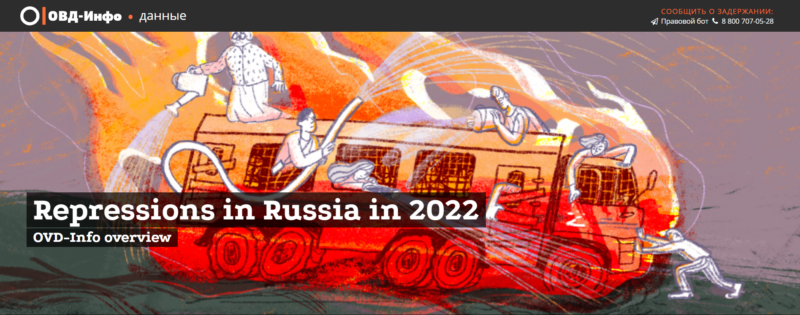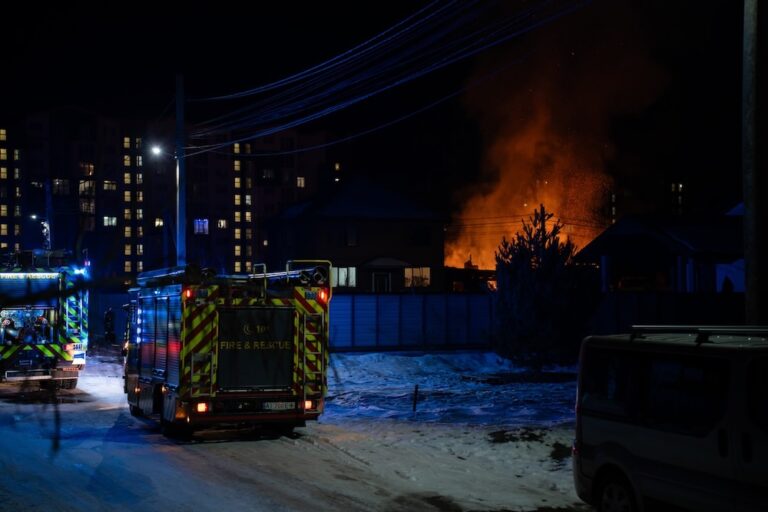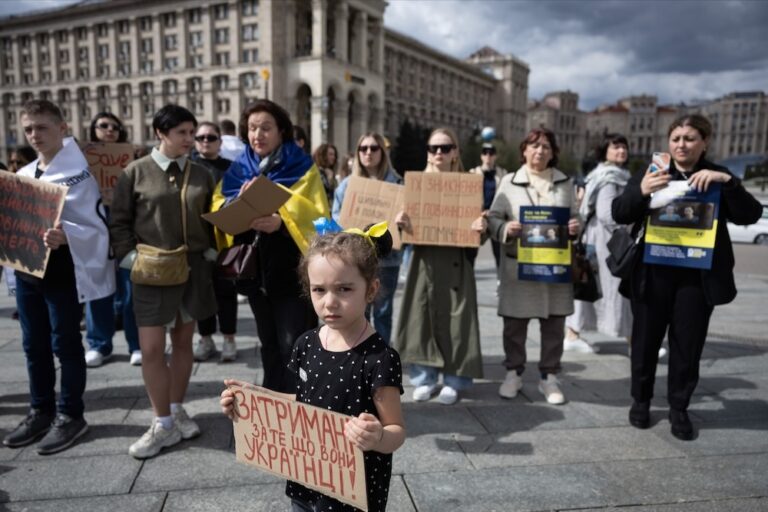In 2022, Russia saw more than 21,000 arrests and at least 370 defendants in criminal cases for anti-war speech; more than 200,000 internet resources blocked; and 11 sentences in cases of state treason.
This statement was originally published on advox.globalvoices.org on 11 January 2023.
Human rights organization OVD-Info collected the main figures on Russian political repressions in 2022

Screenshot of OVD-Info page. Printed with permission from OVD-Info
In 2022, along with the full-scale invasion of Ukraine, the Russian authorities commenced internal repression on an unprecedented scale. There were more than 21,000 arrests and at least 370 defendants in criminal cases for anti-war statements and speeches; more than 200,000 internet resources have been blocked, and there have been 11 sentences in cases of state treason. OVD-Info collected the main figures on political repressions in 2022.
The following is republished by Global Voices with permission of OVD-Info.

This year, people didn’t go only to anti-war protests — there were also environmental protests in the Verkhnesalda district of the Sverdlovsk region and protests in defense of the Troitsky and Bitsevsky forests, the distribution of leaflets about labor rights, actions in support of Sergei Furgal and Alexei Navalny, and pickets against corruption, and against the new LGBTQ+ propaganda law.
Detentions at protests
Detainees at the September protests against mobilization received military conscription notices — we know about 27 departments in 8 cities where this practice was used.
The authorities also began to use the tactics of preventive detentions during public holidays and other events. A total of 141 people were detained using the facial recognition system on security cameras in the Moscow metro. The authorities confirmed that rally participants’ biometrics are entered into the facial recognition system.
The police actively brutalized protesters. During mass rallies both in spring and autumn of 2022, OVD-Info received plenty of reports of the use of force by police officers during detention, in police buses, and departments: people were knocked to the ground, thrown onto the asphalt, beaten with truncheons, strangled, beaten in the stomach, face, eyes, their heads were hit against the wall, their hands were twisted and wrung. One of the most outrageous cases of this year is the torture and humiliation of young women in the Brateevo police station in Moscow. However, this case is not the only one.
In 2022, the persecution of the defendants in the so-called “palace case” (where people were detained for supporting Navalny) continued. In just a year, more than 23 defendants in the case were sentenced. Among them, for example, are the editors of student magazine DOXA, who were sentenced to two years of hard labor. Six more defendants had their sentences revised to harsher ones, and two had their sentences revised.
This year, activists who, according to law enforcers, organized protests in 2021 were forced to compensate for “the overtime” of the security forces involved. At least RUB 13.7 million were paid (roughly USD 199,000): RUB 2.4 million in Ufa (USD 35,000), RUB 3 million in Novosibirsk (USD 43,500), RUB 435,000 in Samara (USD 6300), RUB 750,000 in Kemerovo (USD 11,000), RUB 3.93 million in St. Petersburg (USD 57,000), RUB 2.1 million in Chelyabinsk (USD 30,500), RUB 103,000 in Kirov (USD 1,500), RUB 472,000 in Tambov (USD 6800), RUB 565,000 in Yekaterinburg (USD 8200).
Many defendants in the palace case have already served their sentences and been released. OVD-Info spoke to some of them on the anniversary of the January protests.
Between February 24 and December 12, OVD-Info recorded at least 8,500 administrative detentions of women for expressing anti-war positions in various forms, which is about 45 percent of all known detainees. In recent years, the share of women detained at rallies has increased significantly: in 2021, at rallies in support of Alexey Navalny, it was 25–31 percent, and in 2022, at rallies after the announcement of mobilization on 21 and 24 September — 51 percent and 71 percent, respectively.
Pressure on lawyers

Among other pressures, for example, Maria Bontsler, a lawyer cooperating with OVD-Info, was fined twice under the article on discrediting the military for saying the word “war” in court hearings where she defended participants in anti-war rallies.
The police often take detainees’ phones so that they cannot contact lawyers. In addition, the police use physical force against attorneys. For example, in early March, the police used force against lawyer Alexey Kalugin and did not let him into the department to see his client. His colleague, lawyer SergeiyPodolsky, was taken to a separate room by the police officers, where they threatened him.
The Ministry of Justice has demanded that at least two lawyers be disbarred due to their anti-war statements: Alexey Baranovsky and Mikhail Benyash. At least three lawyers in Crimea were disbarred because of their human rights activities and work on cases related to Hizb-ut-Tahrir.
Cases against the Anti-Corruption Foundation (FBK) and Alexei Navalny
At least 23 people became defendants in the department of cases of an extremist community associated with the FBK and Navalny’s headquarters. Of these, 22 are related to the headquarters and/or FBK, of which five people are in custody. Two of those five are Navalny himself and FBK cameraman, Pavel Zelensky, who are sentenced due to other cases.
On March 22, Alexey Navalny was sentenced to nine years in a strict regime colony in a fraud case. At least 10 more criminal cases, combined into one, have also been initiated against him.
In 2022, Navalny was in solitary confinement nine times, spending a total of 90 days in it. Navalny was also transferred to a cell-type room with no right to receive visitors, and without letters passing through.
Read more: Shallow grave: Putin’s dictatorship is slowly killing Russia’s main opposition leader Navalny
Andrey Zayakin, a Novaya Gazeta journalist and co-founder of Dissernet, was charged with financing extremist activities (Part 1, Article 282.3 of the Criminal Code). The reason for the criminal prosecution was donations of the FBK. The Ministry of Internal Affairs established the names of five more people in addition to Zayakin, who transferred money to the FBK that day — who they are is still unknown.
‘Anti-extremism’ and ‘anti-terrorism’ cases

In 2022, the SOVA Center (a research and information center which publishes news on nationalism and xenophobia, human rights in Russia) recorded 106 cases of illegitimate prosecution under Article 20.3 of the Code of Administrative Offenses (propaganda or public display of Nazi paraphernalia or symbols, or paraphernalia or symbols of extremist organizations). Often these cases of prosecution are connected with Ukraine — the slogan of “Slava Ukraini” (Glory to Ukraine), the songs “Chervona Kalina” (the Red Viburnum) and “Bayraktar” were all, for some reason, considered attributes of extremist organizations by courts in Crimea.
Read more: Popular Russian singer answers ‘Glory to Ukraine’. Now they want to revoke his citizenship
Cases connected to national security

In 2022, at least 20 persons suspected of high treason were detained, according to the First Department. One of them was detained for “helping foreign powers in activities against the security of Russia,” and two for defection. Let us note that one of the accused in high treason, Gleb Verdiyan, is charged with Article 30, Part 1 and Article 275 of the Criminal Code — it is likely that he, too, will be accused of preparation for defection, but we cannot count him in this statistics because we cannot prove this hypothesis.

The journalist Ivan Safronov was sentenced to the maximum prison term for high treason: 22 years for two episodes in the case. The physicist Alexander Lukanin was sentenced to the minimum term: 7.5 years. According to the First Department, physicists are the most numerous group among those accused of high treason.
Read more about the statistics on the persecution of religious organizations, the violation of electoral rights, criminal and administrative prosecution for anti-war stance, the application of the foreign agents law, and other repressive measures of the Russian state against its own citizens in 2022, in OVD-Info’s original report in English or Russian.



